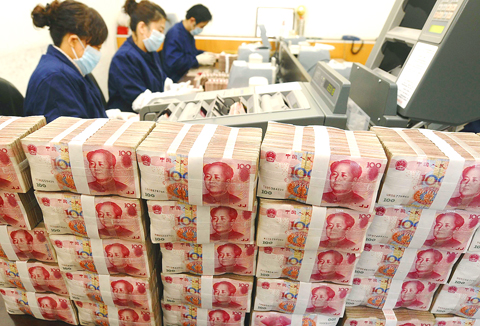Europe’s incoming trade commissioner lashed out on Tuesday at what he said was a “deliberate” policy by China of keeping its currency undervalued, in a remark sure to irritate Beijing.
Warning that China’s foreign exchange stance posed a “major problem” for global economic recovery, Belgium’s Karel De Gucht highlighted growing EU unease on the issue.
His criticism of China’s effective peg of the yuan to a weak dollar and how it undercuts European exporters came after a confirmation hearing before lawmakers in Brussels.

PHOTO: REUTERS
“It is obvious that the undervaluation of the Chinese currency is a major problem,” De Gucht said.
“It is clear to me that this is a deliberate policy and we should address this on all possible occasions, bilaterally and also multilaterally,” he said.
De Gucht had already warned that China “must show its responsibility” and “address thorny questions, such as currency misalignment.”
His comments come amid increasingly sour trade disputes with China over products ranging from shoes to screws.
Chinese Premier Wen Jiabao (溫家寶) said last month that international pressure over China’s currency policy was “unfair,” with Beijing insisting that it has done more than its fair share to get the global economy back on its feet.
The Asian giant’s exports soared 17.7 percent last month to see it overtake Germany as the world’s biggest exporter, illustrating how its economy has got through the slump better than most.
Its trade partners, especially the US and the EU, have long complained that a weak currency gives China an unfair trade advantage at their expense.
De Gucht said another “primary focus” would lie in breaking down US “barriers behind the border, predominantly owing to differences in regulation.”
He also dismissed French-led calls to impose a carbon tax at EU frontiers, saying such a levy risked triggering “an escalating trade war on a global level.”
On the stalled WTO negotiations for global trade liberalization in the Doha round, De Gucht said he was “personally confident” a deal could finally be reached “in 2010 or 2011.”
More broadly, he said he would seek as a rule to manage his new brief without compromising human rights, climate or labor issues while seeking the EU’s core economic growth objective “in a sustainable way.”
To that end, he wanted to protect EU companies’ roles in an global green economy so as to avoid the bloc losing out on key technologies as production migrated oversees, as had happened with microchips.
A majority of the deputies attending the hearing agreed at a subsequent meeting to support De Gucht’s nomination.

Authorities have detained three former Taiwan Semiconductor Manufacturing Co (TMSC, 台積電) employees on suspicion of compromising classified technology used in making 2-nanometer chips, the Taiwan High Prosecutors’ Office said yesterday. Prosecutors are holding a former TSMC engineer surnamed Chen (陳) and two recently sacked TSMC engineers, including one person surnamed Wu (吳) in detention with restricted communication, following an investigation launched on July 25, a statement said. The announcement came a day after Nikkei Asia reported on the technology theft in an exclusive story, saying TSMC had fired two workers for contravening data rules on advanced chipmaking technology. Two-nanometer wafers are the most

DEFENSE: The first set of three NASAMS that were previously purchased is expected to be delivered by the end of this year and deployed near the capital, sources said Taiwan plans to procure 28 more sets of M-142 High Mobility Artillery Rocket Systems (HIMARS), as well as nine additional sets of National Advanced Surface-to-Air Missile Systems (NASAMS), military sources said yesterday. Taiwan had previously purchased 29 HIMARS launchers from the US and received the first 11 last year. Once the planned purchases are completed and delivered, Taiwan would have 57 sets of HIMARS. The army has also increased the number of MGM-140 Army Tactical Missile Systems (ATACMS) purchased from 64 to 84, the sources added. Each HIMARS launch pod can carry six Guided Multiple Launch Rocket Systems, capable of

CHINA’s BULLYING: The former British prime minister said that he believes ‘Taiwan can and will’ protect its freedom and democracy, as its people are lovers of liberty Former British prime minister Boris Johnson yesterday said Western nations should have the courage to stand with and deepen their economic partnerships with Taiwan in the face of China’s intensified pressure. He made the remarks at the ninth Ketagalan Forum: 2025 Indo-Pacific Security Dialogue hosted by the Ministry of Foreign Affairs and the Prospect Foundation in Taipei. Johnson, who is visiting Taiwan for the first time, said he had seen Taiwan’s coastline on a screen on his indoor bicycle, but wanted to learn more about the nation, including its artificial intelligence (AI) development, the key technology of the 21st century. Calling himself an

South Korea yesterday said that it was removing loudspeakers used to blare K-pop and news reports to North Korea, as the new administration in Seoul tries to ease tensions with its bellicose neighbor. The nations, still technically at war, had already halted propaganda broadcasts along the demilitarized zone, Seoul’s military said in June after the election of South Korean President Lee Jae-myung. It said in June that Pyongyang stopped transmitting bizarre, unsettling noises along the border that had become a major nuisance for South Korean residents, a day after South Korea’s loudspeakers fell silent. “Starting today, the military has begun removing the loudspeakers,”